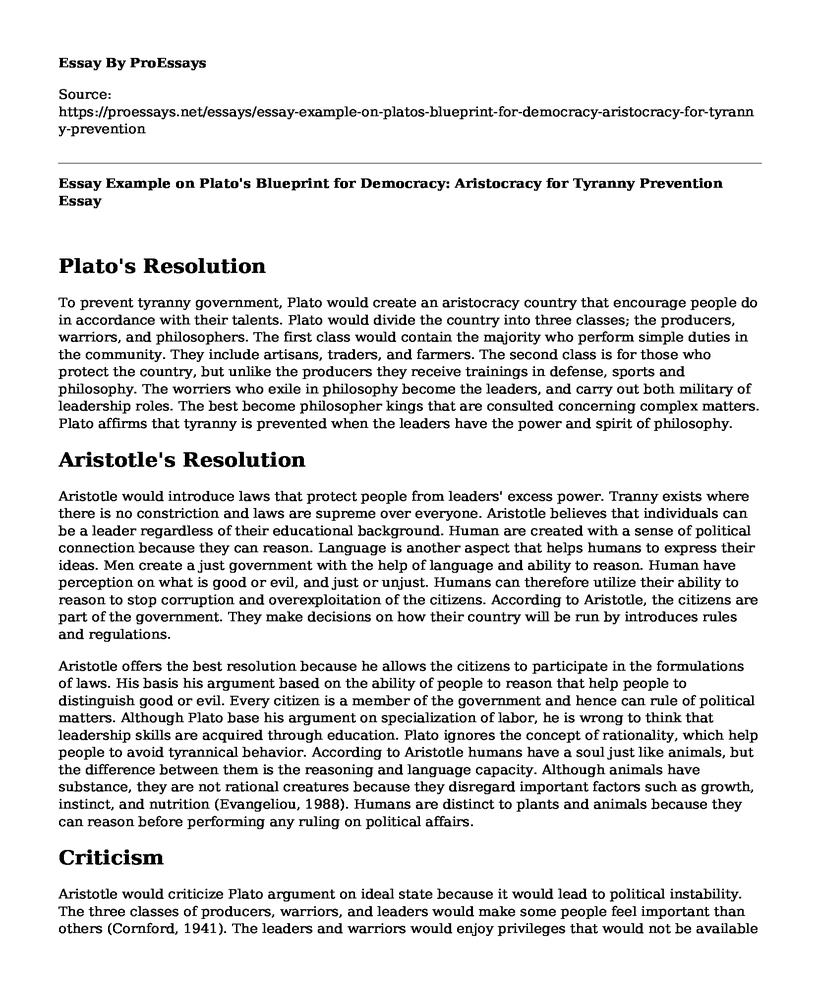Plato's Resolution
To prevent tyranny government, Plato would create an aristocracy country that encourage people do in accordance with their talents. Plato would divide the country into three classes; the producers, warriors, and philosophers. The first class would contain the majority who perform simple duties in the community. They include artisans, traders, and farmers. The second class is for those who protect the country, but unlike the producers they receive trainings in defense, sports and philosophy. The worriers who exile in philosophy become the leaders, and carry out both military of leadership roles. The best become philosopher kings that are consulted concerning complex matters. Plato affirms that tyranny is prevented when the leaders have the power and spirit of philosophy.
Aristotle's Resolution
Aristotle would introduce laws that protect people from leaders' excess power. Tranny exists where there is no constriction and laws are supreme over everyone. Aristotle believes that individuals can be a leader regardless of their educational background. Human are created with a sense of political connection because they can reason. Language is another aspect that helps humans to express their ideas. Men create a just government with the help of language and ability to reason. Human have perception on what is good or evil, and just or unjust. Humans can therefore utilize their ability to reason to stop corruption and overexploitation of the citizens. According to Aristotle, the citizens are part of the government. They make decisions on how their country will be run by introduces rules and regulations.
Aristotle offers the best resolution because he allows the citizens to participate in the formulations of laws. His basis his argument based on the ability of people to reason that help people to distinguish good or evil. Every citizen is a member of the government and hence can rule of political matters. Although Plato base his argument on specialization of labor, he is wrong to think that leadership skills are acquired through education. Plato ignores the concept of rationality, which help people to avoid tyrannical behavior. According to Aristotle humans have a soul just like animals, but the difference between them is the reasoning and language capacity. Although animals have substance, they are not rational creatures because they disregard important factors such as growth, instinct, and nutrition (Evangeliou, 1988). Humans are distinct to plants and animals because they can reason before performing any ruling on political affairs.
Criticism
Aristotle would criticize Plato argument on ideal state because it would lead to political instability. The three classes of producers, warriors, and leaders would make some people feel important than others (Cornford, 1941). The leaders and warriors would enjoy privileges that would not be available to the producers. The producers would quarrel as they try to fight for equality (Evangeliou, 1988). Aristotle would also criticize Plato's idea on making philosophers to rule the state because they have knowledge. Leadership knowledge is not acquired through education but practice. Plato would criticize Aristotle idea on the significance of tyranny as in a country. Aristotle state that tyranny prevents monarch and misuse of power, but Plato claims that tyranny is the cause of those vices. Aristotle would criticize Plato argument that philosophers can make proper ruling as long as they have knowledge. He ignores the concept of reasoning that help leaders to make just decisions (Evangeliou, 1988).
To solve the issue of tyranny movement, I would introduce two institutions; the leaders, and the judges. The role of the leaders would be to make laws for the common good of the citizens. The judges should act as intermediaries between the leaders and the citizens. The judges would listen to the grievances of the citizens and pass them to the leaders and vice versa.
Conclusion
In conclusion, many nations are worried about tyrannical government like the Plato and Aristotle. Most governments have developed constitutions that uphold rule of law and prevent oppression. In United States, powers are divided into the executive, the legislative and judiciary. Each institution checks the operations of the other to prevent misuse of power. Nations can adopt Aristotle conclusions on politics because they were developed from observation of different types of governments.
References
Cornford, F. M. (1941).The republic of Plato. Oxford University Press.
Evangeliou, C. (1988). Aristotle's categories and porphyry (Vol. 48). Brill. Retrieved from https://books.google.co.ke/books?hl=en&lr=&id=4Zh2Ft96W-wC&oi=fnd&pg=PR11&dq=+Evangeliou,+C.+(1988).+Aristotle%27s+Categories+and+Porphyry+(Vol.+48).+Brill.+&ots=uux1XHelbw&sig=o-b_Kj5CXU9I9Osy5vrNOipSYNI&redir_esc=y#v=onepage&q=Evangeliou%2C%20C.%20(1988).%20Aristotle's%20Categories%20and%20Porphyry%20(Vol.%2048).%20Brill.&f=false
Cite this page
Essay Example on Plato's Blueprint for Democracy: Aristocracy for Tyranny Prevention. (2023, Mar 02). Retrieved from https://proessays.net/essays/essay-example-on-platos-blueprint-for-democracy-aristocracy-for-tyranny-prevention
If you are the original author of this essay and no longer wish to have it published on the ProEssays website, please click below to request its removal:
- Addressing New Jersey's Opiate Issue - Sociology Essay Example
- Difference Between Rule Ethics and Situation Ethics in Moral Decision Making
- Essay on Morality: Drug Legalization versus Drug Prohibition of Hard Drugs
- Essay on Trump Admin's Stand on Legalizing Marijuana: Impact on the Nation
- Essay Example on Founders of the US: An Intergovernmental Perspective
- Legislative Changes & Gideon J. Tucker: Navigating Legal Battles With Diligent Watchfulness - Essay Sample
- Ethics & Standards: The Basis of Psychological Practice - Essay Sample







